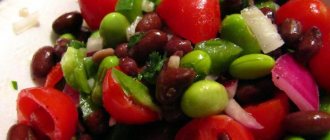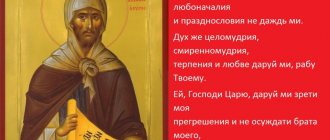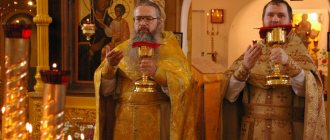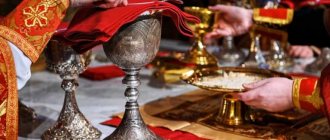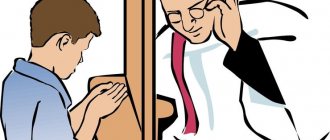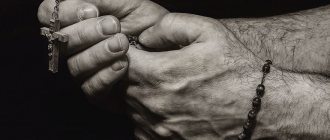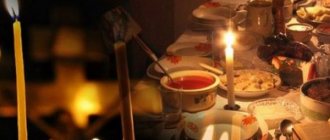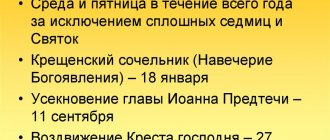Fasting in Orthodoxy is a very responsible time for every believer, during which there is a struggle with passions, abstinence from everything that can come between a person and God. By observing it, Christians eat lighter foods, limit themselves in communication and in various pleasures. According to the Holy Scriptures, fasting is considered one of the means of saving the soul. According to many spiritual fathers, it strengthens the spirit and body. The Church recommends fasting on the eve of some sacred rites, which will be discussed below.
Is fasting always necessary before confession and communion?
Fasting before confession is not strictly obligatory if it is held without subsequent communion. It is necessary to fast only if the confessional rite will be combined with this sacrament.
Unlike confession, you should always fast before communion. This ritual is considered one of the most important for Christians. Communion symbolizes unity with God through the reception of the Mysteries of Christ - bread (the Body of Christ) and wine (His Blood). By receiving communion, a layman receives hope for the salvation of his soul. This can be done quite often, but it is best to do it at least once a month.
Every Sunday in Orthodox churches there is a liturgy - a morning Divine service, during which confession with communion is required. When coming to church on this day for confession and communion, you must be properly prepared.
In the past, believers who fasted before communion were required to fast for at least one week. Today the Orthodox Church allows the laity to limit themselves less - for three days.
Eucharistic fast before the Liturgy of the Presanctified Gifts
Communion of the Holy Mysteries by Christians on an empty stomach is an ancient church-wide norm[1]. It is established by the 16th canon of St. Timothy of Alexandria, canons 41 (50)[2], 47 (58) of the Council of Carthage and the 29th canon of the Fifth-Sixth Ecumenical (Trullo) Council. In addition, in the indicated 47th canon, the fathers of the Council of Carthage, saying that the Divine Liturgy can only be served on an empty stomach, make a reference to the First Ecumenical Council: “we have heard about the Nicene study of faith: about the sacred rite that occurs after dinner, it is true that let it be done worthily by those who do not eat, and then this is established.”[3]
The canons establish not only a general principle, but also specifically stipulate cases when the Liturgy is served not at the usual time, in the morning, but at a later time - after lunch, in the evening: during the late Eucharist, communion should also be celebrated on an empty stomach. The 41st canon of the Council of Carthage says: “If there is a commemoration of certain bishops or others who have died in the evening, then let it be accomplished through prayers only when those who perform it find themselves having dined.”[4]. The 47th rule quoted above also states that when the Liturgy is served late (after lunch), it is celebrated “without eating.”
As is known, the document “On the Participation of the Faithful in the Eucharist”, approved at the Bishops’ Conference of the Russian Orthodox Church in 2015, referring to the decision of the Holy Synod of the Russian Orthodox Church of November 28, 1968, allows for a six-hour Eucharistic fast before communion at the Liturgy of the Presanctified Gifts, if it is served in the evening time (section II.2).
The decision of the Holy Synod in 1968 was made in response to petitions from foreign bishops based on the historical information of the professor of the Leningrad Theological Academy N. D. Uspensky (see Appendix). Professor N.D. Uspensky reported that “there are no direct rules that would abolish abstinence and allow the communion of the Presanctified Gifts of those who have eaten,” but pointed out that the 29th rule of the Trullo Council mentions “certain fathers” who permitted the communion of the Holy Gifts on the Great Thursday went "for some local reasons useful to the Church." Thus, concludes N.D. Uspensky, “the church hierarchy, obviously, can permit the communion of the Holy Mysteries at the Liturgy of the Presanctified, performed in the evening by those who eat, by establishing for them fasting not for the entire day, but for several hours, as far as this is recognized.” useful for the Church."
Indeed, the 41st rule of the Carthage Council allows, as an exception, once a year (on Maundy Thursday) to receive communion without an empty stomach. However, canon 29 of the Trullo Council is the rule of Fr.
Consideration of these two rules leads to the following conclusions:
1) Canons 41 (50) and 47 (58) of the Council of Carthage clearly say that the fathers of the Council of Carthage allowed communion only strictly on an empty stomach. The only exception was Maundy Thursday; no other occasions were envisaged. Therefore, it is incorrect to consider this canon as a precedent for the possibility of receiving communion on an empty stomach on other days of the year.
In addition, the weekday days of Great Lent, when the Liturgy of the Presanctified Gifts is served, cannot be compared in their status (as a time of strict abstinence) with Maundy Thursday. This is a solemn day of remembrance of the Last Supper, on which the full Liturgy is celebrated. Obviously, eating food before Communion in the Carthage Church was allowed not because people could not abstain without food and drink before Communion, but in imitation of the Gospel events, when the Lord gave the Apostles Communion after they had eaten the meal (Luke 22:20; 1 Cor. 11:25)[5].
The famous Byzantine canonist Deacon Alexy Aristinus, warning against possible attempts to revise the canonical prohibition and turn directly to the Gospel events of the Last Supper, wrote: “For although the Lord secretly performed the Passover with his disciples after the supper, we should not, according to the theological voice, follow the examples that are above us, but to observe the custom of the Church, and the priests, without eating food and drink, should bring the Holy Gifts at the altar, just as those who partake of them should not eat food and drink before this.”[6].
2) But even if we assume that the 41st Carthaginian canon creates a precedent for the possibility of receiving communion without an empty stomach, the obligation of the Eucharistic fast remains immutable, since the fathers of the Trullo Council - according to the status of the Fifth-Sixth Ecumenical Council - abolished this decree of the local Carthage Council. This decision, adopted at the pan-Orthodox level, from that time until now has become normative for all Local Churches. Communion of the Holy Mysteries of Christ should always be done on an empty stomach, including at the Liturgy of the Presanctified Gifts, if it is served in the evening.
To complete the coverage of this issue, I would like to add several ascetic-liturgical considerations to the canonical analysis.
The service of the Liturgy of the Presanctified Gifts, established by the liturgical regulations, in conjunction with Vespers (here it does not matter how precisely in the “evening” time: at 14:00, 15:00, 18:00) is included in the general system of ascetic feat of Great Lent, when eating food is allowed only once a day after Vespers. And therefore, abstaining from food and drink until the Liturgy of the Presanctified Gifts in Lent is simultaneously observance of the Eucharistic fast and Great Lent.
The desire to observe the letter of the regulations on the service of this Liturgy in the evening astronomical time [7] will inevitably lead to the question of the possibility of violating not only Great Lent, but the much more important norm of Eucharistic fasting by those who cannot abstain throughout the day. Therefore, church oikonomia is realized here not through a shortening of the Eucharistic fast, but through the service of the Liturgy at an earlier time - which is what is done in practice. Therefore, it is quite appropriate to recognize: those who, for health reasons, cannot withstand a long Eucharistic fast, out of humility, should receive communion at full Liturgies or at those Liturgies of the Presanctified Gifts that are served at an earlier time.
In conclusion, I would like to cite an excerpt from an article by Archpriest Andrei Tkachev, who writes on the topic under consideration: “The unusually long Eucharistic fast is the only serious questioning on the way to the evening Liturgy of the Presanctified Gifts. But isn’t that what fasting is for, to feel hunger and thirst, some subtle weakness in the body and slight dryness in the belly? Have we completely abandoned work, effort, abstinence and are only good for gratifying our weaknesses? One has only to try, and there will be more people ready to fight and pray than we thought. Children do not receive communion at this service. For them there is Saturday and Sunday. They will say: they say, old people cannot live without medicine and food for long. But for them there is Saturday and Sunday. And those who can not eat or drink until the evening, who are strong and strong, who, due to their youth and excess strength, are disturbed by carnal passions, let them endure and fight with themselves. I’ll tell you more: in fact, it turns out that old people are often more willing to not eat and pray while waiting for Communion than young people. And young people crave achievement more often than we think...”[8].
Thus, serving the Liturgy of the Presanctified Gifts in the evening and receiving communion at it is intended for those who are strong in spirit and body. Those who are not able to endure the feat of long-term abstinence can receive communion at another time.
Priest Alexy Knutov , candidate of theology
01.04.2016
APPLICATION
Journal No. 41 of the meeting of the Holy Synod of the Russian Orthodox Church dated November 28, 1968[9]
Listened:
1. Presentation of His Grace Metropolitan Anthony of Sourozh, Patriarchal Exarch in Western Europe, dated October 2 of this year:
“Your Holiness! I appeal to your archpastoral wisdom with the following matter:
Due to the extreme scattering of believers, living even in London itself at a distance of several hours’ drive from our only church, and the impossibility of the vast majority, who work in the morning, to attend morning services on weekdays, almost all believers are deprived of the opportunity to participate in the celebration of Presanctified Liturgy.
I therefore appeal to Your Holiness with a request to allow the application of the Church Charter on the territory of the Western European Exarchate, which provides for the celebration of the Liturgy of the Presanctified Gifts in the evening.
Before posing this question to Your Holiness, I celebrated several Presanctified Liturgies in the evenings last year. This was received very positively by the believers and gave many of them the opportunity to participate. The serving priest fasted from midnight, and believers who wanted to partake of the Holy Mysteries abstained from food, drink and smoking for the previous seven hours, i.e. from noon.
I hope that you will bless this return to statutory practice, which has already yielded good results in experience.”
2. Presentation of His Grace Archbishop Jonathan of New York and Aleutian, Patriarchal Exarch of the Americas, dated July 29. G.:
“Your Holiness, our gracious High Hierarch and Father! Local living conditions within the Exarchate entrusted to me increasingly raise the question of the need to move the celebration of the Liturgy of the Presanctified Gifts during Holy Pentecost to the evening.
The celebration of the Liturgy of the Presanctified Gifts at ordinary times deprives believers who are busy working in institutions and enterprises of the opportunity to attend this service. If this liturgy were moved to the evening, when the faithful are free from classes, our flock would have the opportunity to attend the service.
Therefore, I filially appeal to Your Holiness and humbly ask you to heed the request and bless us with the celebration of the Liturgy of the Presanctified Gifts in the evening.
In this regard, I dare to address Your Holiness with one more request.
If the Liturgy of the Presanctified Gifts is celebrated in the evening, naturally there will be a need for the faithful to receive communion at this liturgy. And the clergy themselves, performing the liturgy, will receive communion.
This, in turn, raises the question of the time of abstaining from food and drink before the liturgy, that is, before communion.
In view of this, I humbly ask Your Holiness to discuss this issue at the same time and find an acceptable solution in the spirit of church rules and taking into account human weaknesses and church economy.”
3. Historical information on the issue of communion of the Holy Mysteries on an empty stomach by Professor of the Leningrad Theological Academy N.D. Uspensky dated October 15 this year. G.:
“The Lord Jesus Christ established the Sacrament of Communion after supper, and the apostles partook of the Divine Body and Blood after eating (Luke 22:20; 1 Cor. 11:25). This order in the celebration of the Eucharist, as sanctified by the example of the Lord Himself, was followed by the apostles and the Christians of the first generations.
The increase in the number of members of Christian communities and the associated difficulty in arranging common evening meals, or agape, caused the separation of the Eucharist from agape and the transfer of the former to the morning. This reform, the first in the history of the Eucharist, was not carried out simultaneously in all Churches. In some Churches, such as the Roman Church, this innovation took place already in the middle of the 2nd century (St. Justin the Philosopher, Apology, ch. 65-67), in others, in particular in Egypt, back in the 5th century the Eucharist was celebrated in the evening ( Socrates, Ecclesiastical History).
The transfer of the Eucharist from evening to morning in itself brought about a new order in life - the communion of the Holy Mysteries on an empty stomach. This tradition became universal as the order of celebrating the Eucharist in the morning spread. Evidence of the change in the order of communion of the Holy Mysteries is the 41st rule of the Carthage Council. Actually, this rule was adopted in Italy at the Council of Hippo in 393 (right 28) and was later included in the Code of Rules of the Council of Carthage. This rule read: “Let the Holy Sacrament of the altar be performed by people who have not eaten. Excluded from this is the only day in the year on which the Lord's Supper is celebrated. If the remembrance of certain people who died in the evening, bishops or others, then let it be accomplished through prayers only when those who perform it find themselves having dined.” From this rule we can conclude that even at the end of the 4th century in certain Churches, like the Ippon Church, there was an ancient practice of receiving the Holy Mysteries after eating. The Council, obviously following the new order, as generally accepted, prohibits communion after eating, making an exception in this regard for Maundy Thursday.
The VI Ecumenical Council abolished the above-mentioned rule regarding the communion of the dead on Maundy Thursday, explaining that such an exception for Maundy Thursday could be made “for some local reasons useful for the Church” (Rule 29).
As for communion with the Presanctified Gifts, it originates from the ancient Christian custom of receiving the Holy Mysteries or “self-communion” at home with the Holy Mysteries brought from the church where the Eucharist was celebrated. Tertullian mentions this custom (letter to his wife). The day and hour of communion were set by the communicant himself. This custom was supported by the anchorites and from them entered into monastic worship. The monks received communion either after completing the morning rule, or, which was obviously associated with the varying strictness of fasting, in the evening. The rite of representation is an ancient rule or order for the brethren to receive communion at the end of the morning service, and the Liturgy of the Presanctified arose on the basis of the communion of the Presanctified Gifts in the evening. In the 4th and 5th centuries, when the order of communion on an empty stomach began to be established as universal, the communion of the Presanctified Gifts - either in the morning or in the evening - was also performed on an empty stomach. This ultimately led to the transfer of the Liturgy of the Presanctified Gifts to the first half of the day, although it begins with the rite of Vespers.
If you celebrate the Liturgy of the Presanctified Gifts in the evening, then, obviously, the question of abstaining on this day from eating until the evening will arise. There are no direct rules that would abolish this abstinence and allow the communion of the Presanctified Gifts of those who have eaten. However, on the basis of the same 29 canon of the VI Ecumenical Council, which states that “these holy fathers” (i.e., the Councils of Hippo and Carthage) allowed the communion of the Holy Gifts on Maundy Thursday for those who went “for some local reasons useful to the Church,” church the hierarchy, obviously, can permit the communion of the Holy Mysteries at the Liturgy of the Presanctified, performed in the evening by those who eat, by establishing for them fasting not for the entire day, but for several hours, as far as this will be considered “useful for the Church.”
4. Review of His Grace Archbishop Basil of Brussels and Belgium on this issue dated November 27, 1968:
“I fully agree with the considerations expressed in the submissions of His Eminence Exarchs Anthony and Jonathan about the desirability of celebrating the Liturgy of the Presanctified Gifts in the evening, as well as with the rules about the timing of fasting for communicants and celebrants. I can only say that the evening Presanctified Liturgies should be introduced with caution, depending on local conditions and the composition of the faithful. They can be introduced more easily among Orthodox Christians of Western origin than among Russians, and more easily among young people than among old ones. In Belgium it is already carried out in the Belgian Orthodox Mission, and in Holland - in Groningen, at Fr. John Haveman."
Resolved:
1. To bless in the churches of the Moscow Patriarchate the celebration of the Divine Liturgy of the Presanctified Gifts in the evening where the ruling bishop deems it useful.
2. When celebrating the Divine Liturgy of the Presanctified Gifts in the evening hours, abstinence for those receiving communion from eating and drinking must be at least six hours; however, abstinence before communion from midnight from the beginning of the given day is very commendable, and those who have physical strength can adhere to it.
[1] By communion on an empty stomach, in accordance with a stable tradition, we mean complete abstinence from food and drink from midnight until holy communion (clause II.2 of the document “On the participation of the faithful in the Eucharist”, adopted at the Bishops’ Conference of the Russian Orthodox Church in 2015). The very fact of this tradition indicates that what prevails in it is not the physiological absence of any food or drink in the stomach, but rather the very feat of abstaining from eating anything until Holy Communion at the onset of a new astronomical day. This means that discussions linking abstinence before communion with the time required to digest food reduce the ascetic understanding of the Eucharistic fast to a merely “technological” fast.
[2] The numbering of the canons of the Council of Carthage according to the Book of Rules is indicated in brackets.
[3] Bishop Nikodim (Milash), commenting on this canon, writes: “There is no such resolution among the rules of the Council of Nicaea (First Ecumenical Council), but it is possible that they discussed this, as well as the day of celebrating Easter and allowing priests to marry at the Council of Nicea, and a corresponding conclusion was made, which is preserved in those acts that the African fathers who were at the council brought with them (Carth. 1)" (Nicodim, Bishop of Dalmatia-Istria. Rules of the Orthodox Church. M., 2001. Vol. II . P. 197).
[4] Explaining this canon, Bishop Nicodemus points out that “the rule also cites the case when, after dinner, it is necessary to perform a commemoration (παράθεσις, commendatio) for some of the dead, and the Liturgy was served according to custom. Regarding this, the rule stipulates that the Liturgy can only be performed by a clergyman who has not had lunch, but if he has had lunch, then commemoration should be limited only to prayers without the Liturgy” (Ibid. p. 191).
[5] Bishop Theodore Balsamon, commenting on the 29th canon of the Trullo Council, writes: “The Holy Fathers, gathered in Carthage, knowing that our Lord Jesus Christ celebrated his mysterious Pascha and taught the bloodless Sacrifice after he had performed the legal one with his disciples Easter and ate from it, they commanded that deacons and priests who touch the Holy Place should not eat the rest of the time, but on Holy Thursday they should perform sacred acts after eating food” (Rules of the Holy Ecumenical Councils with interpretations. M., 2000. P. 374) .
[6] From his explanation on the 41st (50th) canon of the Council of Carthage (Rules of the Holy Local Councils with interpretations. M., 2000. P. 501).
[7] Here it can be noted that the celebration of this Liturgy in some churches of the Russian Orthodox Church in the evening (after 17:00) surpasses in this regard even the strict Athos tradition, according to which the Liturgy of the Presanctified Gifts is served several hours earlier (about 14:00 in terms of since the so-called Byzantine times).
[8] Andrey Tkachev, archpriest. Liturgy of the Presanctified Gifts. https://www.pravoslavie.ru/46030.html Date of publication: 04/19/2011.
[9] Journal of the Moscow Patriarchate. 1969. No. 1. P. 3-5.
What can a fasting person eat?
The list of foods allowed for consumption during fasting before confession with communion includes:
- bread;
- cereal porridge;
- lean soups;
- pasta (without eggs);
- vegetable and fruit salads;
- legumes;
- dried fruits;
- fermented dishes;
- mild homemade preparations;
- greens, mushrooms;
- nuts, seeds.
Drinks allowed are juices, compotes, tea, coffee, cocoa, jelly, fruit juice, plain and mineral water. It is recommended to replace animal milk with plant-based analogues (soy, coconut or almond). You can eat many sweets during Lent - kozinaki, marmalade, halva, lollipops, Turkish delight, honey.
During fasting, it is recommended to drink holy water instead of ordinary water. You need to consume it in an amount of 2 liters per day. If confession and communion are imminent, a fasting Christian must constantly read prayers of repentance and reflect on the sins he has committed and intends to repent of.
What to do after Communion
At the end of Communion, you do not need to leave immediately, you must wait until the end of the liturgy and venerate the cross. Then, most often, prayers of gratitude are read, which everyone who has been honored with Communion remains to listen to. If for some reason the prayers are not read publicly, you can thank the Lord yourself, in church or at home, depending on the circumstances. Prayers of thanksgiving are in prayer books; they usually appear after the Follow-up to Communion.
Forbidden menu
Fasting people will need to give up certain foods:
- meat food (sausages, sausages, any types of meat, lard);
- eggs and dishes containing them;
- offal (liver, lungs, heart);
- milk and fermented milk products;
- chocolate, confectionery;
- mayonnaise, ketchup, sauces, mustard;
- baked goods containing milk and eggs.
It is imperative to remove spices and spicy foods from the menu, which stimulate the appetite and desire to eat. On days of strict fasting, fish is also prohibited.
Alcohol and smoking are completely excluded. It is worth noting that these bad habits are unacceptable for believers not only during the period of fasting, but also on ordinary days.
How often should you take communion?
Until 1917, there was a practice of starting the main Sacrament only once a year. Some also received communion in all four fasts of the church year.
Modern pastors most often advise doing this at least every month. Some try to receive communion more often, while others begin the Sacrament once every few months, but regularly.
The frequency of communion is usually determined by the spiritual state of a person, his desire, and, of course, it is worth consulting with a confessor or simply a priest of the temple.
Other restrictions
Fasting not only requires you to follow a diet. It also implies spiritual abstinence. During this period it is necessary:
- avoid noisy companies and entertainment events;
- exclude visits and receptions at home;
- refuse intimacy.
The days before communion should be spent in constant prayer. According to church rules, the canons to the Lord, the Queen of Heaven and the Guardian Angel must be read. On the day of the ceremony, you cannot eat anything after midnight. In the morning, shortly before the sacrament, it is forbidden to eat food and drink holy water. You should never smoke before the ceremony.
Some categories of laity are temporarily prohibited from confessing and receiving communion. Women who are undergoing their menstrual periods are not allowed to be present in the temple. An exception may be a special situation when it comes to mortal danger or serious illness.
On Sunday, when confession with communion will be held, you must get up at 5–6 o’clock in the morning. That's why it's better to go to bed early on Saturday. On Sunday, before going to church, it is necessary to read the canon of repentance to the Lord Jesus Christ, the canon for communion, as well as prayer texts from the prayer book.
How to fast before Communion
At the present time, liturgical fasting is considered obligatory in the Russian Orthodox Church. From midnight before the day of communion, it is forbidden to eat or drink until the Sacrament is performed. If the Liturgy is celebrated at night (Easter, Christmas), then the last meal should be no later than 6 hours before communion.
By tradition, Orthodox Christians observe fasting, limiting themselves to food of animal origin (meat, milk, eggs). The most common tradition is a three-day fast, and such a fast is called preparatory (preparatory). According to the 2015 concept of the Russian Orthodox Church “On the participation of the faithful in the Eucharist,” for those believers who observe all multi-day fasts throughout the year and fast on Wednesday and Friday, the fast before communion is reduced to one day. In this case, the fast may be canceled altogether; it is necessary to consult with a priest). Also, the duration of the preparatory fast can be either increased or decreased for each Christian individually. This decision is made after a conversation or confession with the parish priest (confessor).
Saint Paisius the Svyatogorets, when asked about fasting and how to fast before Communion, answered:
“It is impossible to put all people under the same brush when it comes to the question of how often one should receive communion and how many days one should fast before Holy Communion. The confessor must, with judgment, determine how often the believer should receive communion, and how long he should fast before Holy Communion. It all depends on how much strength a person has. At the same time, the confessor must lead a person to spiritual fasting - abstinence from passions” (from the book “Spiritual Struggle”).
During Bright Week (the week after Easter), the preparatory fast is canceled. All gastronomic restrictions are lifted this week. Every Christian believer can begin Communion without fasting.
Who is allowed to weaken the fast?
Sometimes fasting before confession or communion becomes less strict. It may weaken:
- for pregnant women;
- babies;
- weakened or sick children;
- adults, children with acute, chronic diseases;
- believers who have recently undergone surgery;
- people engaged in heavy physical labor and in difficult life situations.
Some of the prohibited foods can be eaten by nursing mothers. However, it must be remembered that in all cases considered an exception, obligatory mental fasting is assumed.
If an adult or child is about to receive the sacrament of communion, the possibility of weakening or canceling the fast must be agreed upon with the priest. Father will make the right decision after studying all the details of the existing situation.
In conclusion, it is necessary to recall that a believer needs fasting not only for bodily limitations. By themselves, they mean little if the most important spiritual component is missing. Having refused to eat certain types of food, it is necessary to simultaneously get rid of internal dirt, sinful thoughts and intentions in every possible way. Only comprehensive abstinence of soul and body will allow a Christian to properly prepare for the great church sacraments commanded by the Savior himself - confession and communion.
Holy Communion - what is it in simple words
This is the union of the believer with Christ, not only spiritual, but also physical. Through the prayer of the priest, the bread and wine are mysteriously “transformed” into the Body and Blood of Jesus.
This means that they, according to the theologian N.D. Uspensky, have “one nature of bread and wine, which do not cease to be such, and one supernatural nature, which the elements brought into the Holy Eucharist acquire through the action of the Holy Spirit on them.”
How the things of this world, remaining themselves, receive the Divine nature is a mystery inaccessible to the human mind.
What is the essence and meaning of Communion
The essence of the Sacrament itself:
- in the transformation of bread and wine into Body and Blood;
- in the very communion of the faithful with them.
The meaning of what is happening is to overcome the gap that arose between God and man after the Fall. Having fallen away from God of his own free will, a person in the same way, of his own free will and intention, can return to Him.
This opportunity is a great gift, unavailable for thousands of years even to the righteous of the Old Testament, who were not worthy of union with God - what can we say about the pagans? For centuries they tried to “storm the sky” - either by building majestic temples to the gods or by making bloody sacrifices. But human nature, which had fallen away from the source of life, did not give him the opportunity to see the right path to the lost Paradise - until the Virgin was found, who, in Her purity and innocence, was worthy to become the receptacle of the Incarnate God. And, most importantly, she agreed to trust Him:
“Behold, the servant of the Lord, be unto Me according to thy word...”
Thus, the Incarnation of Christ from the Mother of God opened the way for people to God - through union with Him, which is possible at any time through the Sacrament of Communion. But - only by the voluntary consent of a person, his request, that is, prayer. That is why the Spirit does not “spontaneously” descend on bread and wine, transforming them into Body and Blood, but through the prayer of the priest .
Every Christian is also free to deprive himself of the Sacrament or to begin the Cup of Life. The Lord is waiting for everyone to come to Himself.
What does it mean to “take Communion”?
One of the meanings of this word is “involvement,” that is, direct participation. You can be involved in an event, be part of a family or another group. A person can be called “involved” in some business or project. But through the Eucharist he becomes involved in God - literally physically. This is evidenced by one of the prayers of thanksgiving performed by a Christian after the Sacrament.
The person praying asks Jesus Christ:
“...Go into my hearts, into all my parts, into my womb, into my heart. The thorns of all my sins fell. Cleanse your soul, sanctify your thoughts. Confirm the compositions with the bones together...”
Why does a person need Communion?
It is necessary:
- the soul - then why the body needs food; this is spiritual “nutrition”, union with God, without which spiritual “starvation” will certainly occur: the world with its vanity will so enslave the soul that the road to Paradise will be completely closed to it;
This is how the saint writes about it. Paisiy Svyatogorets:
“When a person stops praying, he moves away from God and becomes like an ox: he works, eats, sleeps. And the more he moves away from God, the worse it becomes. The heart becomes cold, and then he can no longer pray at all...”
To prevent this from happening, it is necessary to unite with Christ.
- the body - it is subject to passions, the fight against which is impossible with human strength; It also happens that the Lord, through the main Sacrament, even deigns to heal the most terrible diseases, if such healing is useful to the sufferer and leads him to faith.
A well-known incident occurred in 1991 in the church of St. John’s Convent in St. Petersburg. It is described by journalist Dmitry Orekhov, author of the book “Holy Places of Russia”.
To the relics of rights. John of Kronstadt, the servant of God Valentina, who was sick with oncology, once came here - she had already been discharged from the hospital with the sentence “to go home and die.” They say that when she first entered the temple (even though she had lived nearby all her life, it was a quarter of an hour’s walk), she didn’t even know how to cross herself correctly. After listening to the patient, the priest blessed her to confess and receive communion daily. The patient began to come to the Sacrament every day - which could have been her last. It took her at least an hour to get to the monastery, she felt so bad. But what hurt worse than her body was her soul, burdened with sins... Therefore, the woman did not immediately notice that she was gradually reaching her already beloved temple faster and faster - now half an hour, now 15 minutes... Only a month later, during an examination, the stunned doctors stated: she is healthy!
What does Holy Communion give to a person?
Those who regularly approach the Sacrament say that it is:
- spiritual peace that Christ promised to His disciples: “My peace I leave with you, my peace I give to you...” (John 14:27);
- strengthening in the fight against sin and passions;
- unspeakable joy.
Special categories of believers
The Eucharist is a sacrament that helps lay believers to know God’s grace, heal the soul, cleanse themselves of sins and become closer to the Lord. After communion, a person always experiences joy, high spirits, and feels wings behind his back. There are no age restrictions for the ritual, however, there are categories for which the Church makes concessions during fasting:
- children under 7 years old;
- pregnant women;
- nursing mothers;
- sick;
- travelers;
- prisoners;
- pupils of a boarding school or orphanage;
- military personnel;
- lying on their deathbed.
Children under 7 years old
Pregnant and lactating women
Seriously ill patients
Relaxations in fasting
The Church allows all the categories mentioned above to make fasting softer. The clergyman can write out the Lenten menu himself, excluding dry eating from the mandatory rule. Thanks to the development of culinary art, today even the simplest products can be used to prepare healthy and tasty food.
People living outside the home or in institutions with restricted diets usually cannot control their diet. The clergy allow them not to refuse government food, but to spend more time in prayer, communicating with God and rethinking their lives.
Only seriously ill or dying people are allowed to receive the sacrament of the Eucharist without preparation.
Also, concessions are made to pregnant women and nursing mothers, since strict abstinence should not affect the child. Young children need to be introduced to the sacrament from childhood, gradually preparing their body for fasting. But people who are on a diet for medical reasons are considered to be fasting, and therefore there are no strict rules for them.
You should not treat fasting as a punishment or a simple diet. Govenye is a wonderful way to get closer to the Almighty and take the path to the Kingdom of Heaven.
If you find an error, please select a piece of text and press Ctrl+Enter.
